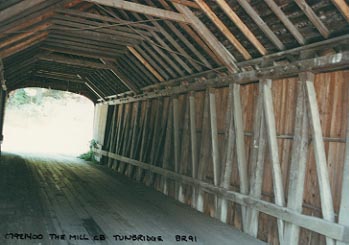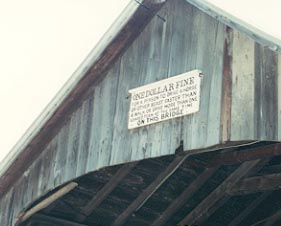millinsp
The Mill (Hayward) Covered Bridge Inspection Report In Brief:
Description: Constructed in 1883 by unknown* builder. The bridge is
constructed with a multiple-kingpost truss, verticle members 8x6", braces 6x3.5". The deck 12x3"
planks laid longitudinally. The siding is vertical 'inch' plank unpainted. Roofing is metal, abutments
are cast concrete. Bridge measurements: Length: 72.1', Width: (c-c truss)17', Width inside
clear: 16.04' Vertical clear: 12''.
*built by Arthur Adams per Tunbridge Historian, Euclid
Farnham

Inspection report: April 1993
Structural Evaluation: Numerous bottom chord repairs and splices. Broken diagonal
truss members. Failed corbels on truss vertcals, poor lateral bracing.
Traffic Study results: 1991:150 vehicles per day
Recommendations: For long term solution Option D - Rehabilitate for moderate traffic
to capacity of 30,000 pounds.
The estimated cost (1993):
Repairs = $40,000
Total = $100,000
The Covered Bridge Inspection Program:
In the spring of 1995, the Vermont Agency of Transportation completed the inspection of the
seventy-five covered bridges that serve state and town highways. In the course of the survey,
some
of the bridges were found to be unsafe and were closed to traffic -- others were found to be in
need
of repair.

The recommendations include one of five options based on the condition of the bridge and the type of traffic the bridge supports:
Option A: The community may close the bridge to vehicular traffic, with traffic diverted to existing roads and bridges.
Option B: The community may continue to use the bridge for light vehicular traffic, with heavier truck traffic diverted to other routes.
Option C: The community may close the bridge to traffic and construct an adjacent bypass bridge.
Option D: The community may rehabilitate the bridge to support moderate traffic safely.
Option E: The community may replace the bridge and move it to a nearby preservation site.
Joe Nelson
P.O Box 267, Jericho, VT 05465-0267
jcnelson@together.net
No part of this web site may be reproduced without the written permission of Joseph C.
Nelson
Text Copyright © 1997, Joseph C. Nelson
Photographs Copyright ©, 1997, Joseph C. Nelson
Illustrations Copyright ©, 1997, Joseph C. Nelson
This file updated 1-17-00